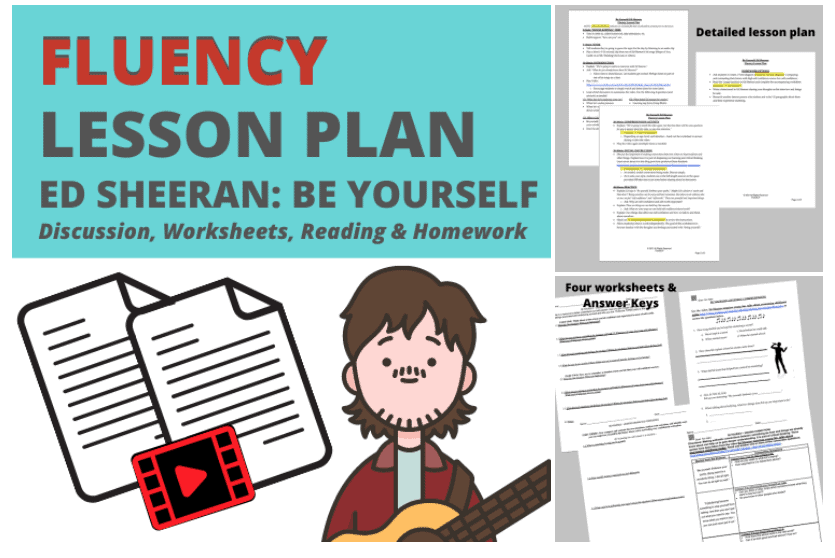“Be yourself.”
There! All issues of self-doubt, self-stigma, and anxiety have been brushed away. Right?
Yeah… There’s a bit more work to do.
I got started thinking about this and how to do that work during fluency therapy after watching part of a speech that Ed Sheeran gave at the 2015 American Institute for Stuttering Gala. In it, he describes his own childhood and experiences with stuttering.

At one point Ed says, “Just be yourself because there is no one in the world that can be a better you than you. And if you try to be the cool kid from class, you end up being very boring…Be yourself, embrace your quirks. Being weird is a wonderful thing.”
So how do you get there? More importantly, how do you, as an SLP, help someone who stutters get there?
I created a fluency lesson plan on it. Before I tell you about it, let’s talk about something else. Spoiler alert: this post contains a few affiliate links, but don’t worry – there’s no cost to you.
Self-Esteem & Stuttering
It seems to me that “be yourself,” is related to self-acceptance and other concepts of socio-emotional health. For a person to feel comfortable embracing all parts of their identity, they need a pretty healthy belief in their worthiness. This certainly gets into areas that counselors and mental health professionals work with much more deeply and skillfully. Obviously a multidisciplinary approach is ideal.
But that doesn’t quite let us SLPs off the hook.
As part of our work educating others about stuttering and helping people who stutter to minimize negative reactions to stuttering (Yaruss & Reeves, 2013), this is something SLP’s can address.
What does the evidence say?
Dr. Michael Boyle, assistant professor at Oklahoma State University is an expert in this area. In a 2013 paper in JSLHR, he summarizes stigma and stuttering quite well:
Many recent studies have shown that many people who stutter (PWS) experience shame and self-consciousness (Ginsberg, 2000); heightened risk for development of many mental health problems, including social and generalized anxiety disorders, social phobia, and negative affect (Blumgart, Tran, & Craig, 2010; Iverach, O’Brian, et al., 2009; Iverach et al., 2010); and reduced overall quality of life, including lower social and emotional functioning (Craig, Blumgart, & Tran, 2009) compared with fluent controls.
Michael Boyle, PhD in Assessment of Stigma Associated With Stuttering: Development and Evaluation of the Self-Stigma of Stuttering Scale (4S).
These issues and feelings interfere with a persons’ participation in communication. In a 2018 paper published in JSLHR, researchers found that (after controlling for other variables), “self-esteem, self-efficacy, and social support each significantly predicted communicative participation in adults who stutter.”
Their conclusion based on that correlation?
“Speech-language pathologists should be aware of predictors of communicative participation such as self-esteem…they should consider and evaluate these factors in clients who stutter and target them in treatment if necessary.”
Self-Esteem, Self-Efficacy, and Social Support as Predictors of Communicative Participation in Adults Who Stutter
by Michael P. Boyle, Carolina Beita-Ell, Kathryn M. Milewski, & Alison N. Fearon
How exactly do you do it?
I did some reading.
The best resource I came across was this 18 Self-Esteem Worksheets and Activities for Teens and Adults by Courtney Ackerman, a researcher for the State of California and writer at PositivePyschology.com
She’s got lots of great activities.
So, I went back to Ed Sheeran, and I found another video of him talking about stuttering.
Based on some of Courtney’s work and my own previous experience as a language arts teacher, I put together an easy to follow, low-prep fluency lesson plan. I wrote it for speech-language pathologists, classroom teachers, and other professionals to follow.
Fluency Lesson Plan, “Ed Sheeran: Be Yourself”
It can be used in 1-on-1 fluency therapy, in a small group, or in a general education classroom. In the course of the activities, students will learn a bit more about a famous person who stutters, some critical thinking skills, and be introduced to a simple exercise to help build self-confidence.
The basis of the lesson is this video interview of Ed Sheeran. The lesson plan includes minute by minute activities and a suggested teacher script. It also includes three different worksheets. The first is a quick comprehension check for the video. The second focuses on some critical thinking skills and making connections between the “Text” (or video) and self, other texts, and the world. Finally, the last worksheet focuses in on “Be Yourself” a simple activity to help build self-confidence and self-esteem.
The lesson plan also includes four different homework suggestions, that can easily be expanded into other lessons. As a bonus, it includes my 1-page reading and 1-page worksheet on Ed Sheeran for my “Famous People Who Stutter” series.
Other Fluency Lesson Plan Ideas
My fluency lesson plan “Ed Sheeran: Be Yourself” isn’t the only option. There’s plenty of others out there!
You can use one of Courtney’s brilliant resources to create your own!
Nina Reardon-Reeves and Scott Yaruss have a brilliant book, “School-Age Stuttering Therapy: A Practical Guide” filled with brilliant, evidence-based practice on stuttering treatment.
If you’re looking to sharpening your counseling and socio-emotional skills as an SLP, there’s no better guide than David Luterman’s “Counseling Persons With Communication Disorders and Their Families.” It is a fantastic book, easy to read, and great for self-study. Dr. Luterman’s experience as a teacher and counselor really shines through.
Finally, if you like teaching your clients about famous people who stutter, consider teaching about U.S. President Joe Biden.
Have a client who is a sport’s fan?
This 2-page handout on “16 Pro Athletes Who Stutter” makes for some wonderful discussion. And finally, this fluency lesson plan, “George Springer Finds His Courage,” about professional baseball player George Springer is one of my absolutely favorites.
Your Turn
So, are you going to address self-stigma, self-acceptance, and how to be yourself the next time you work with a person who stutters?
Let me know in the comments below or via my contact page.
I’d love to hear how other therapists are addressing these important issues.


